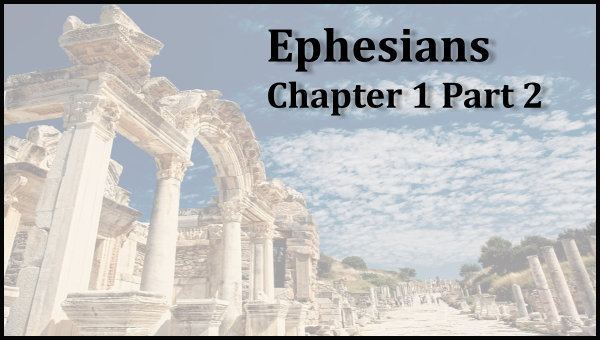By Tyson Thorne

Yesterday we looked at the structure of the first 14 verses of Ephesians chapter one, and today we’ll have a look at the rest of the chapter. Next week we’ll take a closer look at the message Paul delivers and the theology that it teaches.
In verse 15 we see Paul shift from the “we\our” and “you” language to a more personal form of writing. This shift in tone, however, does not mean a shift in topic. Remember that all of chapter one is a single sentence in the Greek, so regardless of how your translation may divide these passages there is no division in the original context. Indeed, verse 15 starts out with the phrase “for this reason”, meaning all that has come before is relevant to what he about to reveal next.
Remember that Paul has just outlined God’s plan for salvation and the Messiah in the first 14 verses. As a result of that plan which equalizes Gentiles with Jews in their relationship with Messiah, and because the people of the church at Ephesus love God and God’s people, Paul prays for their continued blessing and spiritual growth. Regarding their spiritual maturity Paul uses an odd phrase used nowhere else in all of Scripture; he prays for the enlightenment of the “eyes of your heart”. He doesn’t explain this turn of phrase at all, leaving the reader to draw their own conclusions.
This description, “the eyes of your heart”, is striking for another reason. Paul is usually concerned with the state of a person’s mind and speaks far less about the heart. Here, however, Paul changes pace and equates spiritual maturity not to a mind that understands but to a heart that sees and understands the work of God. Maturity, then, is not measured by ones mental agreement with God’s ways alone, but includes a heart that is alignment with one’s head, a whole person that is agreement with God about sin and righteousness and that has submitted itself to the authority of Messiah.
I’ve seen too many who once claimed to follow Jesus fall away on account of the disassociation of heart and mind. I’m not saying these people are not going to enter eternal glory, but they dropped out of the race early, giving up because the cost of alignment was simply too high. They mentally accede that Jesus is the Messiah and that God raised him from the dead and put their trust in him, but find that their commitments change over time. In truth the commitments haven’t changed, the Holy Spirit has simply illuminated those areas that they have not yet yielded fully. For some it was love of success and money, for others it may be love for family or care for animals, and still others it may be social inequality.
We learned in the first half of this chapter that God’s plan was to make Jesus the authority over all things, and here in the last half we learn the plan has come to fruition. It started when God provided his greatest display of power – not the parting of the Red Sea or the confusion of Babel or even the destruction of Sodom and Gomorrah – the raising of Messiah from the grave! Through this singular act of power God triumphed, and through the church the fullness of that power is continually exercised around the world.
If we are to grow spiritually and enjoy all the fruits of God’s power and Messiah’s authority we must continue to grow in our relationship with God. We cannot keep him at arm’s length, we cannot call upon him to fulfill our selfish wish list, nor can we have anything in our lives we value more highly than our relationship with the Lord of Hosts. Without question we can be saved without these things, but we will never experience the fullness of what God offers without surrendering all and finishing the race.
|
|
